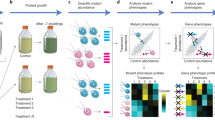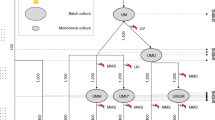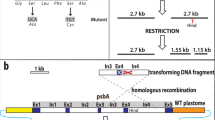Abstract
IN conjunction with experiments concerned with the genetics of photosynthesis in the sexually reproducing, unicellular, green alga, Chlamydomonas reinhardi 1 it became necessary to devise a technique to screen for mutants which were blocked in some phase of their photosynthesis. In the technique to be described here the inability to fix carbon dioxide in the light was taken as a requirement of a non-photosynthetic mutant.
This is a preview of subscription content, access via your institution
Access options
Subscribe to this journal
Receive 51 print issues and online access
$199.00 per year
only $3.90 per issue
Buy this article
- Purchase on Springer Link
- Instant access to full article PDF
Prices may be subject to local taxes which are calculated during checkout
Similar content being viewed by others
References
Levine, R. P., Proc. U.S. Nat. Acad. Sci., 46, 972 (1960).
Levine, R. P., and Ebersold, W. T., Z. Vererbungslehre, 89, 631 (1958).
Allen, M. B., Arnon, D. I., Capindale, J. B., Whatley, F. R., and Durham, L. J., J. Amer. Chem. Soc., 77, 4149 (1955).
Author information
Authors and Affiliations
Rights and permissions
About this article
Cite this article
LEVINE, R. A Screening Technique for Photosynthetic Mutants in Unicellular Algæ. Nature 188, 339–340 (1960). https://doi.org/10.1038/188339b0
Issue Date:
DOI: https://doi.org/10.1038/188339b0
This article is cited by
-
An efficient method for constructing a random insertional mutant library for forward genetics in Nannochloropsis oceanica
Journal of Oceanology and Limnology (2024)
-
Reminiscences of Robert Paul Levine (1927–2022)
Photosynthesis Research (2022)
-
Building a multipurpose insertional mutant library for forward and reverse genetics in Chlamydomonas
Plant Methods (2017)
-
Ultra-violet induced mutants of blue-green algae
Archiv f�r Mikrobiologie (1964)
-
Separation of the Oxygen Evolving System of Photosynthesis from the Photochemistry in a Mutant of Scenedesmus
Nature (1962)
Comments
By submitting a comment you agree to abide by our Terms and Community Guidelines. If you find something abusive or that does not comply with our terms or guidelines please flag it as inappropriate.



